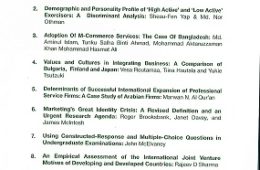World Journal of Management
Vol. 8. No. 1. March 2017, March 2017, Pages: 75 – 93
Human Capital Transfer from Large Enterprises to Small Business: Conditions, Benefits and Threats
Marek Matejun and Piotr Sitkiewicz
Human capital is one of the most important intangible assets of each
modern business entity. This statement is especially important for the small
and medium sized enterprises, which, in most cases lack the tangible
resources. Their ability to compete on the market both locally and globally,
mostly depends on their flexibility, owner's intuition and the quality of
human capital that pushes those companies forward. One of the ways to
acquire desirable human capital by the small and medium sized entities, is
to influence its transfer from large business enterprises. Taking this into
account, the aim of this article is to identify and assess the conditions that
increase the benefits as well as reduce the threats, which result from
human capital transfer from large entities to the small businesses. To
achieve this aim, a research survey was conducted on a sample of 356
micro, small and medium sized companies that operate on polish market.
Based on the above, 2 research hypothesizes were verified. The results
indicate that the growth of benefits and reduction of threats that result from
this specific human capital transfer is determined by the set of: legal,
economic, organizational, socio-cultural conditions and technical conditions.
The results have moreover high managerial implications, giving advice
which conditions should be developed within the companies to increase the
level of benefits associated with the process of human capital transfer, and
at the same time which of those conditions potentially mitigate the risks.
DOI :
https://doi.org/10.21102/wjm.2017.03.81.06

